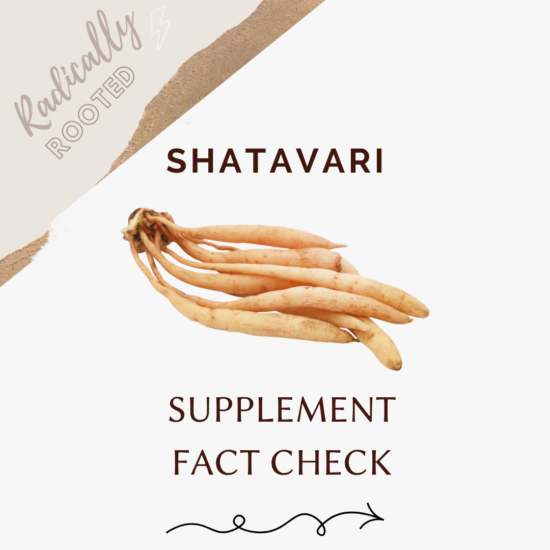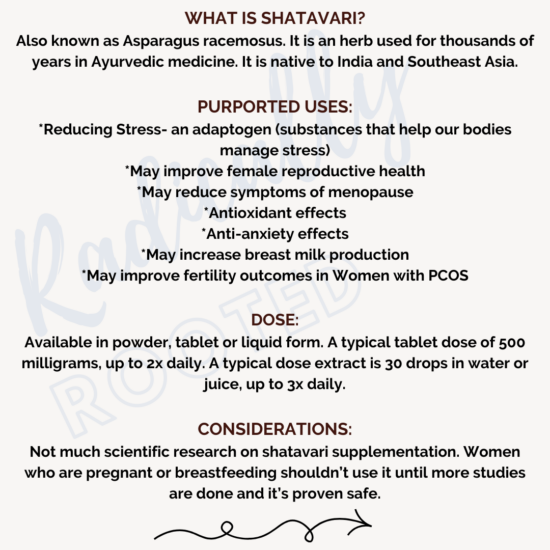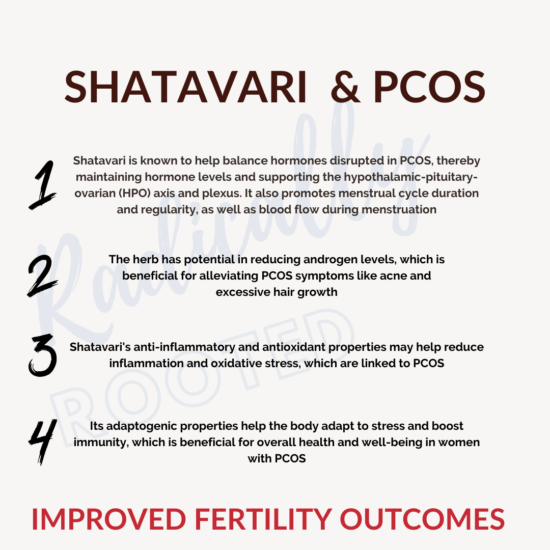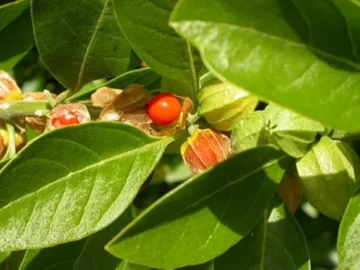Shatavari – Supplement Check
I recently discovered a fascinating supplement called Shatavari. If you’re curious about what it is and how it could benefit your health, don’t worry! I have all the details you need. Although more research is necessary to determine the advantages of Shatavari for humans, it is worth learning more about. In this post, we’ll explore the origins of this Ayurvedic herb and its current uses to understand why it is gaining popularity in the wellness community. Let’s take a closer look!
What is Shatavari and Where does it come from?
Shatavari is also known as Asparagus racemosus. It is an herb used for thousands of years in Ayurvedic medicine. It is native to India and Southeast Asia. Shatavari is derived from the roots of the Asparagus racemosus plant, which is related to the asparagus commonly seen in grocery stores but is a different species.
Shatavari, meaning “the plant with a hundred roots” in Sanskrit, is a natural herb with roots enriched with medicinal properties. Some scriptures also mention the plant as “one with one hundred husbands” since the plant is extremely beneficial for enhancing women’s health and libido. The herb has been traditionally used to improve vitality and is considered a “queen of herbs” in Ayurveda due to its various health benefits. The taste of Shatavari powder is both sweet and slightly bitter.
Potential Health Benefits of Shatavari
The adaptogenic properties of Shatavari are believed to help the body manage stress. Additionally, it is rich in saponins, which are antioxidant compounds.
Research has suggested that Shatavari may provide the following health benefits:
1- Reduces Stress
Shatavari is known as an adaptogen. Adaptogens are herbs, roots and other plant substances (like mushrooms) that help our bodies manage stress and restore balance after a stressful situation. Stress can cause a variety of negative effects on our body, including oxidative stress, which can contribute to an array of potential health issues.

2- Improves Female Reproductive Health
One of the most common traditional uses of Shatavari is to treat female reproductive disorders. A 2018 review of studies published in Biomedicine and Pharmacotherapy suggests that this plant may be effective in improving conditions such as hormonal imbalances and polycystic ovary syndrome (PCOS). We will discuss the details of how Shatavari can help with PCOS shortly.
3- Reduces Symptoms of Menopause
According to recent research, a combination of herbal medicines, including A. racemosus, may help alleviate the symptoms of menopause. The herb has traditionally been used to treat female reproductive conditions. In a small-scale study conducted in 2018, 117 women who took A. racemosus and three other herbs for 12 weeks reported a reduction in hot flashes and night sweats. However, the study did not find any significant difference in hormone levels or overall health.
4- Antioxidant Effects
Antioxidants are beneficial for our body as they protect it from damage caused by free radicals. These free radicals can cause harm to our cells and lead to a number of diseases, including cancer. Oxidative stress is another factor that can cause disease, and antioxidants help fight against it. In 2018, a review suggested that Shatavari may have antioxidant properties, however, more research is needed to confirm this in humans. A study conducted in 2018 found some evidence suggesting that the extract of the shatavari plant had antioxidant effects on mice.

5- Anti-anxiety Effects
Shatavari supplements have also traditionally been used to combat anxiety and depression. No research has investigated these effects in humans, though studies suggest that the plant may have these effects in rats. A 2014 study published in Cellular and Molecular Neurobiology proposes that Shatavari reduces anxiety in rats by interacting with the serotonin and gamma-aminobutyric acid (GABA) systems, which are involved in anxiety, both in rats and humans. Research published in Pharmacology, Biochemistry and Behaviour in 2009 suggests that shatavari extract had antidepressant effects in rats.
6- Breast-feeding and pregnancy
Galactagogues are substances used to induce, maintain, and increase milk production and Shatavari is commonly used for this purpose. Authors of a review published in The Ochsner Journal in 2016 Trusted Source found mixed evidence. One study reported a boost in milk supply after shatavari supplementation, and another showed no difference. More research is needed to ensure that a supplement containing shatavari is safe to take while pregnant or breastfeeding. Especially during these crucial periods, it’s important to speak with a doctor or another healthcare professional before taking any form of Shatavari.

Improved fertility outcomes in women with PCOS
A clinical study was conducted to assess the effectiveness of Ayurveda treatment regimen in treating subfertility caused by Polycystic Ovary Syndrome (PCOS). The treatment included the use of Shatavari along with other herbs. The aim was to correct hormonal imbalances and improve follicular maturity. This would lead to an increase in the secretion of luteinizing hormone (LH) and maintain steady-state follicle-stimulating hormone (FSH) levels, which are essential for follicular maturation. The study revealed that after six months of treatment, a significant number of patients experienced relief from symptoms and showed improved fertility outcomes.
Hormonal Balance and Menstrual Regularity
Shatavari is known to help balance hormones disrupted in PCOS, thereby maintaining hormone levels and supporting the hypothalamic-pituitary-ovarian (HPO) axis and plexus. It also promotes menstrual cycle duration and regularity, as well as blood flow during menstruation.
Reduction of Androgen Levels
The herb has the potential to reduce androgen levels, which can alleviate PCOS symptoms such as acne and excessive hair growth.
Anti-inflammatory and Antioxidant Properties
Shatavari’s anti-inflammatory and antioxidant properties may help reduce inflammation and oxidative stress, which are linked to PCOS.
Immune System Support
Its adaptogenic properties help the body adapt to stress and boost immunity, which is beneficial for overall health and well-being in women with PCOS.
Safety of Shatavari
According to 2003 research, ayurvedic medicine considers shatavari “absolutely safe for long-term use, even during pregnancy and lactation.” Still, there’s not much scientific research on the side effects of Shatavari supplementation. Women who are pregnant or breastfeeding shouldn’t use it until more studies are done and it’s proven safe.
There are reports of allergic reactions in some people who take Shatavari. If you’re allergic to asparagus, avoid this supplement. Seek medical attention if you experience worsening asthma or allergic reaction symptoms.
This includes:
- rash
- fast heart rate
- itchy eyes
- itchy skin
- difficulty breath
Dosage and administration
Shatavari supplements are available in powder, tablet or liquid form. Shatavari isn’t well studied in humans. No standardized dose has been established.
According to an article published in the Journal of the American Herbalists Guild, these doses may prevent kidney stones:
- 4-5 milliliters of Shatavari root tincture, three times daily
- a tea made from 1 teaspoon of powdered shatavari root and 8 ounces of water, twice daily
Shatavari is available in powder, tablet, and liquid forms. A typical dose of shatavari tablets is 500 milligrams, up to twice daily. A typical dose of shatavari extract is 30 drops in water or juice, up to three times daily.



